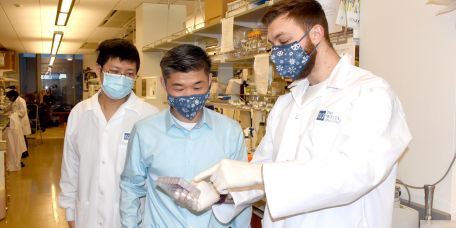Press Releases
July 20, 2021
PHILADELPHIA — (July 20, 2021) — Alternative polyadenylation (APA) is an RNA processing mechanism that regulates gene expression by generating different ends on RNA transcripts of the same gene. Thou…
June 29, 2021
PHILADELPHIA — (June 29, 2021) — New biomarkers that predict HIV remission after antiretroviral therapy (ART) interruption are critical for the development of new therapeutic strategies that can achi…
June 2, 2021
PHILADELPHIA — (June 2, 2021) — The Wistar Institute, an international biomedical research leader with special expertise in cancer, immunology and infectious disease research and vaccine development…
June 1, 2021
PHILADELPHIA — (June 1, 2021) — The Wistar Institute, an international biomedical research leader in cancer, immunology and infectious diseases, announces the appointment of Noam Auslander, Ph.D., as…
May 20, 2021
PHILADELPHIA – May 20, 2021 – The Wistar Institute has partnered with doctors and scientists across America at National Cancer Institute (NCI)-designated cancer centers to issue a joint statement urg…
May 17, 2021
PHILADELPHIA and MELBOURNE, Australia — (May. 17, 2021) — A team of scientists from The Wistar Institute in Philadelphia and the Peter MacCallum Cancer Center in Melbourne, Australia, discovered a ne…
April 27, 2021
PHILADELPHIA — (April 27, 2021) — The Wistar Institute and the University of Bologna (Unibo) in Italy have established the Wistar-Unibo Ph.D. Exchange Program in Cell and Molecular Biology to bring U…
April 22, 2021
PHILADELPHIA — (April 22, 2021) — A synthetic DNA vaccine candidate for Middle East respiratory syndrome coronavirus (MERS-CoV) developed at The Wistar Institute induced potent immune responses and a…
April 1, 2021
PHILADELPHIA — (April 1, 2021) — Scientists at The Wistar Institute identified a new mechanism of transcriptional control of cellular senescence that drives the release of inflammatory molecules that…
March 23, 2021
PHILADELPHIA — (March 23, 2021) — The Wistar Institute, a global leader in biomedical research in cancer, immunology and infectious disease, is pleased to announce the appointment of Richard M. Horow…









